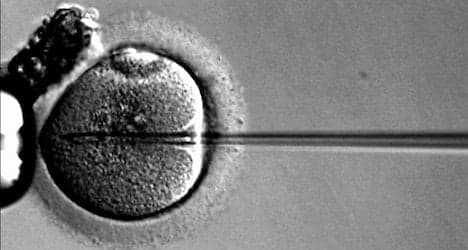Swiss ‘assisted tech’ babies double in 10 years

One couple in six in Switzerland depend on artificial insemination or “assisted reproductive technology” to have a child, according to new figures from Bern.
A total of 6,321 women used the method last year, almost double the rate from 10 years earlier (3,467), the federal statistics office said.
“The increase reflects a social phenomenon,” gynecologist Estilla Maurer-Major, a Zurich-based fertility specialist, told the Schweiz am Sonntag newspaper.
“On the one hand, more couples again want to have children, and on the other hand, first-time mothers are becoming older and likely need medical help to get pregnant.”
Often the sterility of the man is an issue, affecting 43 percent of males in Switzerland, the newspaper reported.
Fifteen years ago in Switzerland, women in such cases depended on anonymous sperm donations, meaning that the child would later not know who her biological father was.
But from 2,000 children annually produced from a test tube in Switzerland last year, only 100 of them involved sperm donors.
Instead, other methods were used, with the most common being intracytoplasmic sperm injection (ICSI), Schweiz am Sonntag said.
This technology, first pioneered in the early 1990s following earlier experiments and later fine-tuned, involves injecting a single sperm cell with a syringe directly into an egg from the mother’s womb for fertilization.
Around 80 percent of the 10,827 reproductive treatments in Switzerland involved ICSI, the statistics office said.
The rest were through in vitro fertilization, popularly known as the test-tube baby process, used when the fertility problem is with the woman.
Artificial insemination was used for women aged from 19 to 51 last year, according to the government figures.
The fertility of women begins to decline significantly after the age of 35.
The chances drop to between 10 and 20 percent for women aged 40.
“For many women, the desire to have children comes late and then suddenly it’s too late, even for treatments,” Maurer-Major told Schweiz am Sonntag.
The average age for women who receive artificial insemination in switzerland is 37.
On average, every third treatment leads to a pregnancy “so that we can help around seven out of 10 women under 35,” Maurer-Major said.
Comments
See Also
A total of 6,321 women used the method last year, almost double the rate from 10 years earlier (3,467), the federal statistics office said.
“The increase reflects a social phenomenon,” gynecologist Estilla Maurer-Major, a Zurich-based fertility specialist, told the Schweiz am Sonntag newspaper.
“On the one hand, more couples again want to have children, and on the other hand, first-time mothers are becoming older and likely need medical help to get pregnant.”
Often the sterility of the man is an issue, affecting 43 percent of males in Switzerland, the newspaper reported.
Fifteen years ago in Switzerland, women in such cases depended on anonymous sperm donations, meaning that the child would later not know who her biological father was.
But from 2,000 children annually produced from a test tube in Switzerland last year, only 100 of them involved sperm donors.
Instead, other methods were used, with the most common being intracytoplasmic sperm injection (ICSI), Schweiz am Sonntag said.
This technology, first pioneered in the early 1990s following earlier experiments and later fine-tuned, involves injecting a single sperm cell with a syringe directly into an egg from the mother’s womb for fertilization.
Around 80 percent of the 10,827 reproductive treatments in Switzerland involved ICSI, the statistics office said.
The rest were through in vitro fertilization, popularly known as the test-tube baby process, used when the fertility problem is with the woman.
Artificial insemination was used for women aged from 19 to 51 last year, according to the government figures.
The fertility of women begins to decline significantly after the age of 35.
The chances drop to between 10 and 20 percent for women aged 40.
“For many women, the desire to have children comes late and then suddenly it’s too late, even for treatments,” Maurer-Major told Schweiz am Sonntag.
The average age for women who receive artificial insemination in switzerland is 37.
On average, every third treatment leads to a pregnancy “so that we can help around seven out of 10 women under 35,” Maurer-Major said.
Join the conversation in our comments section below. Share your own views and experience and if you have a question or suggestion for our journalists then email us at [email protected].
Please keep comments civil, constructive and on topic – and make sure to read our terms of use before getting involved.
Please log in here to leave a comment.